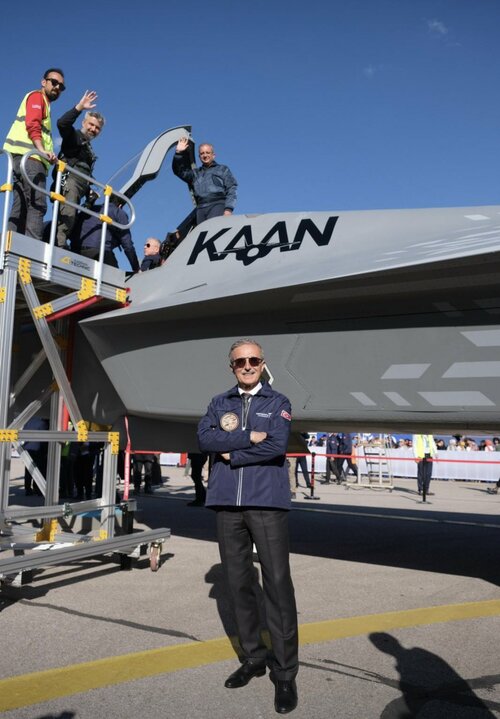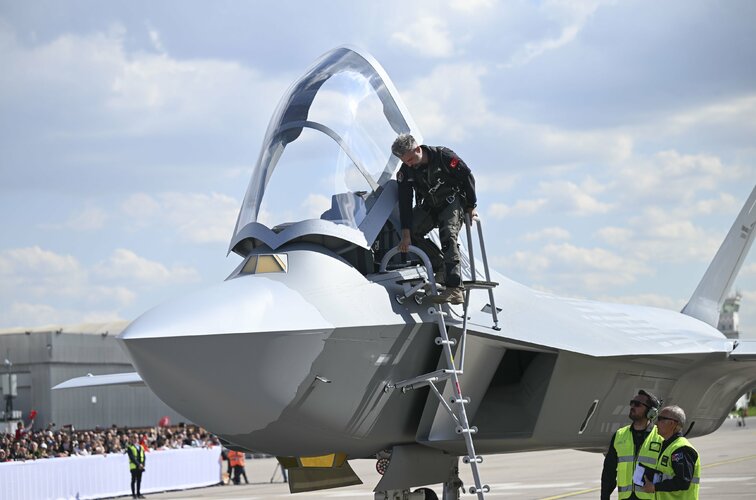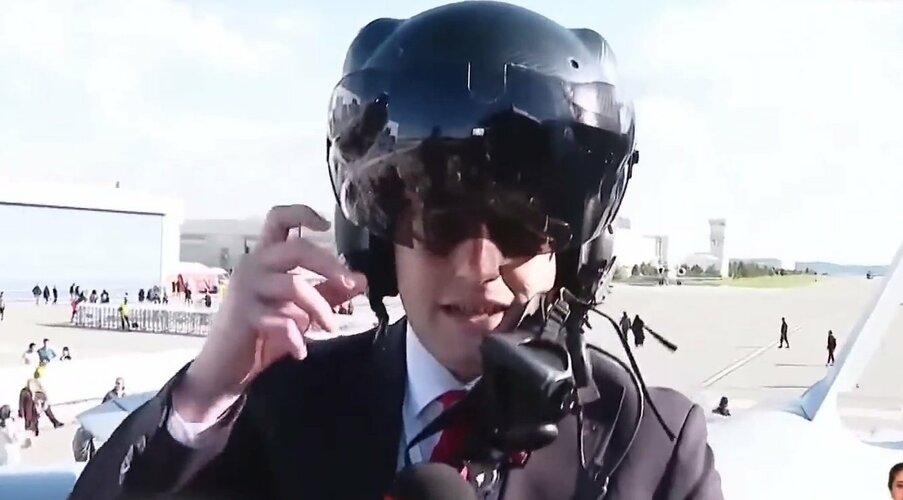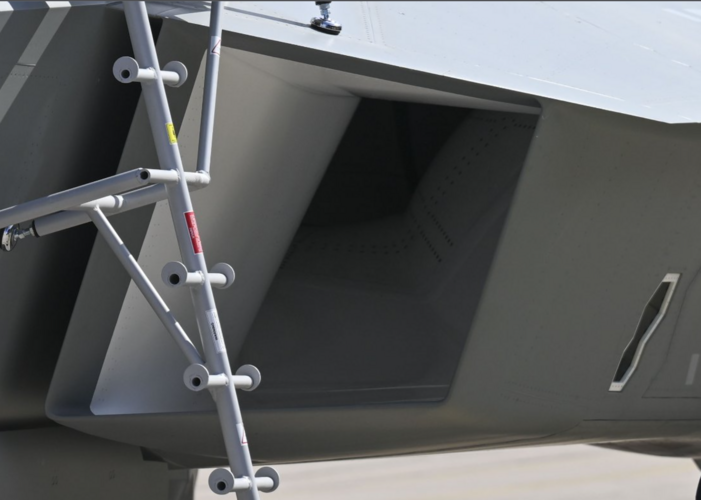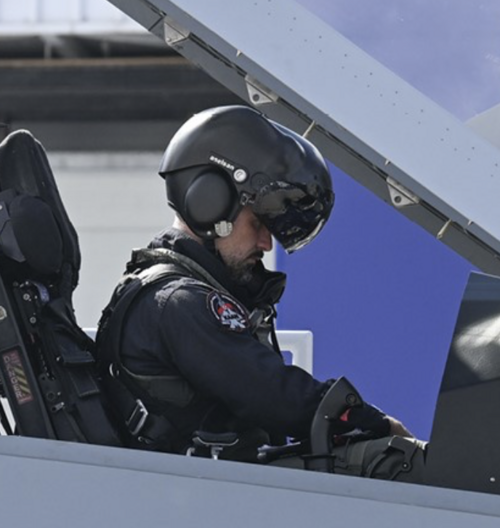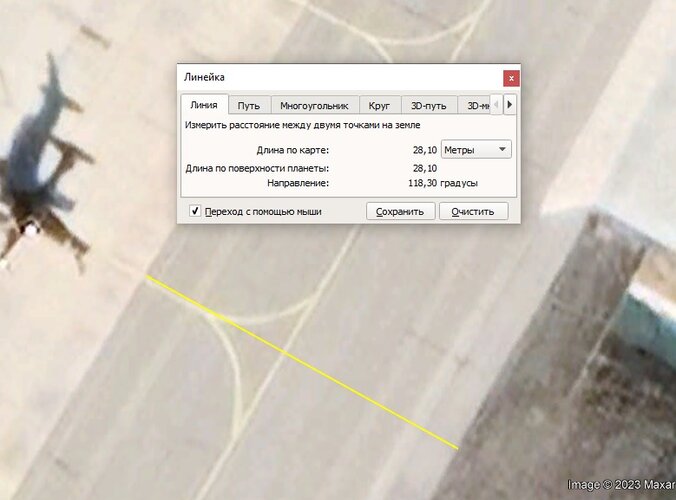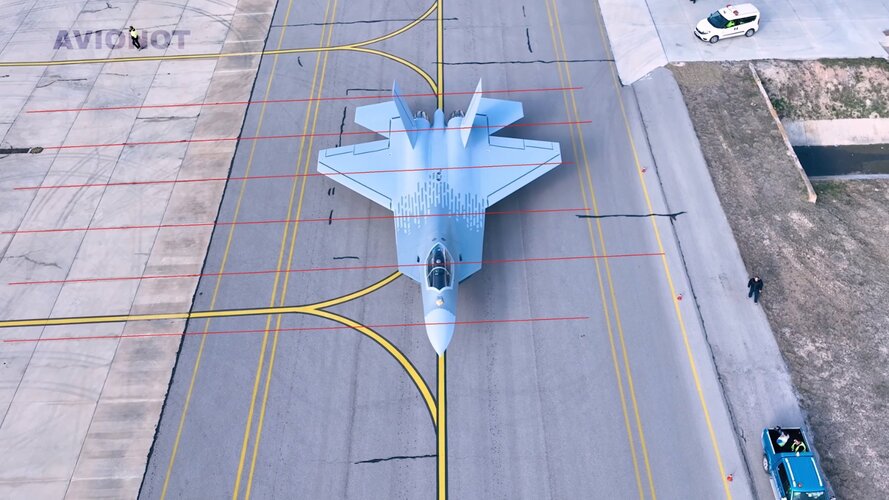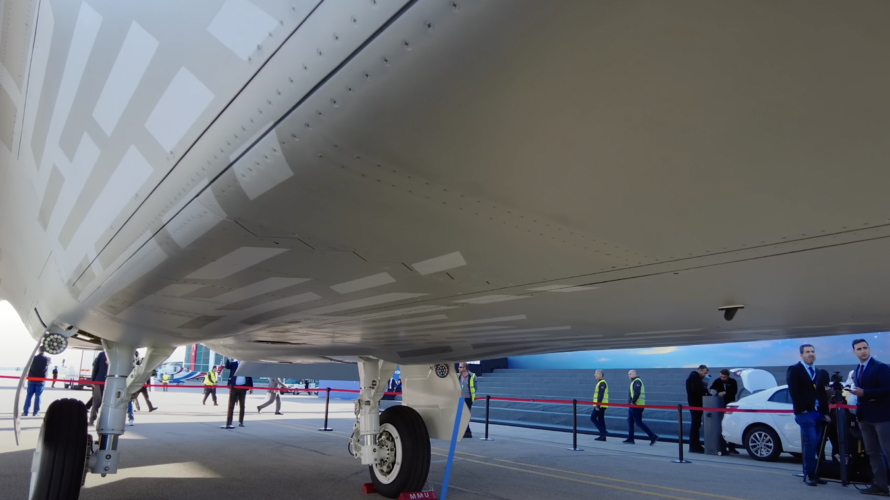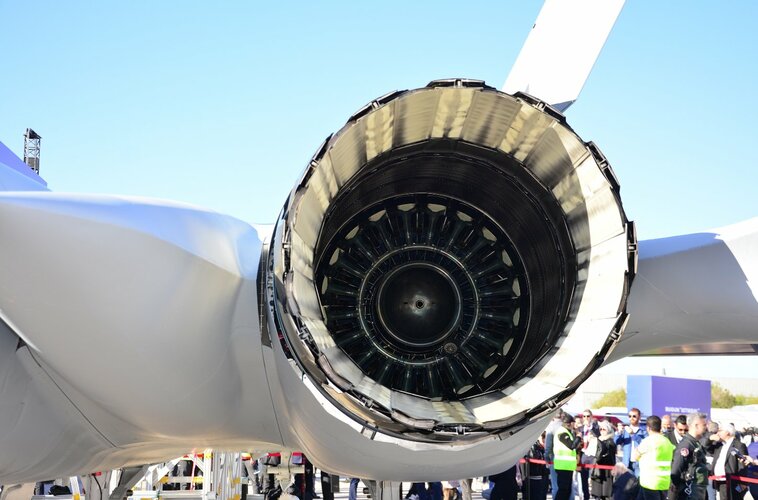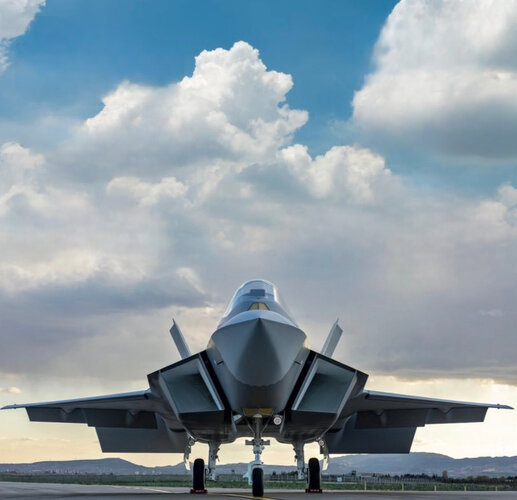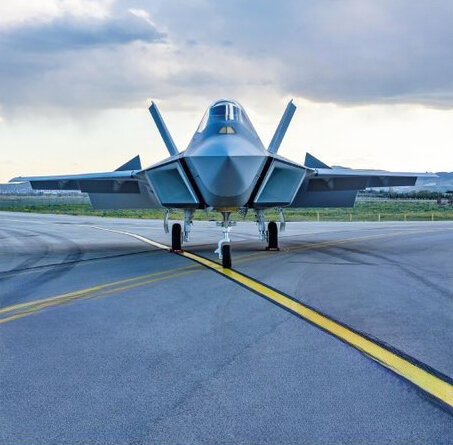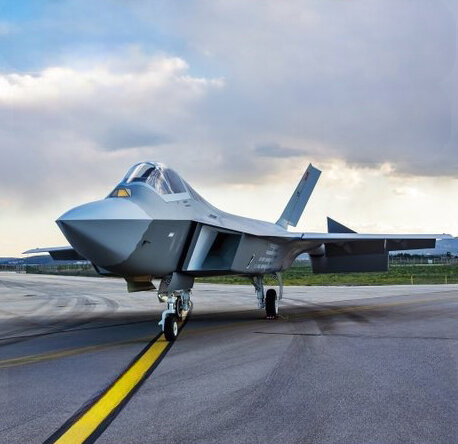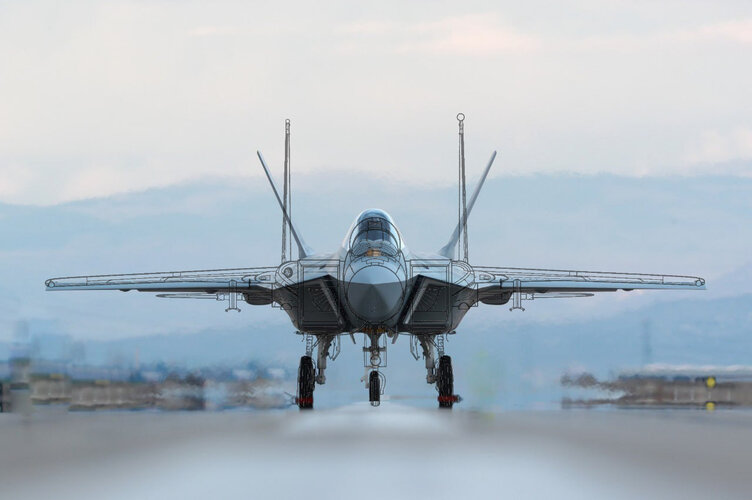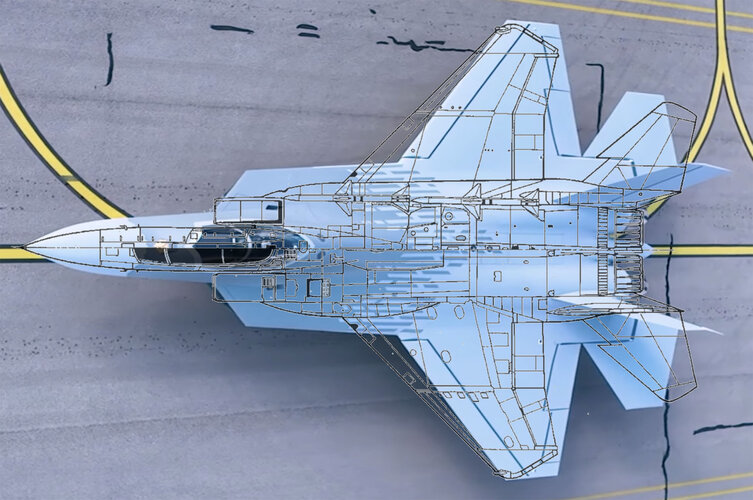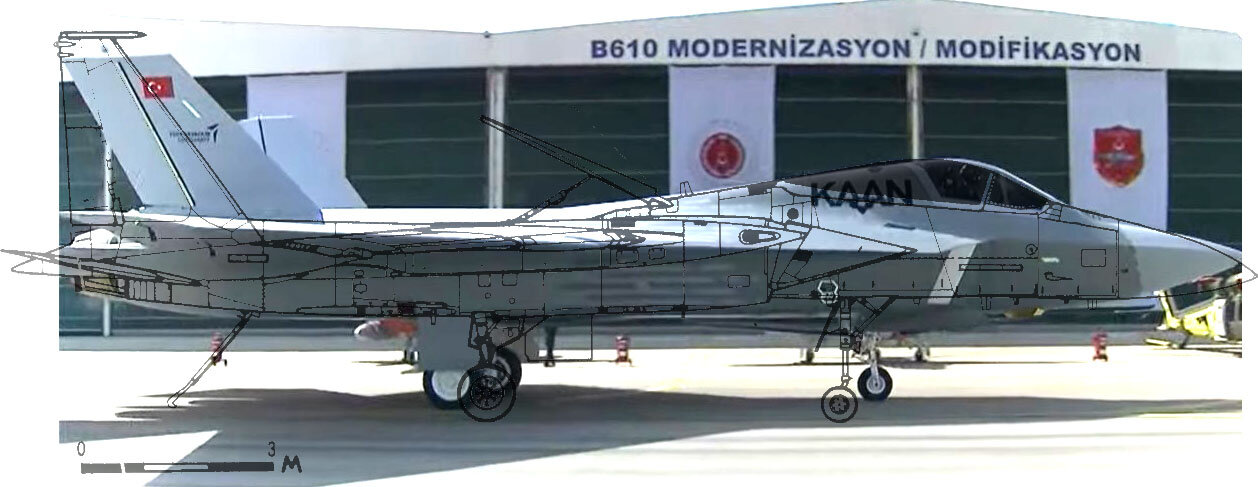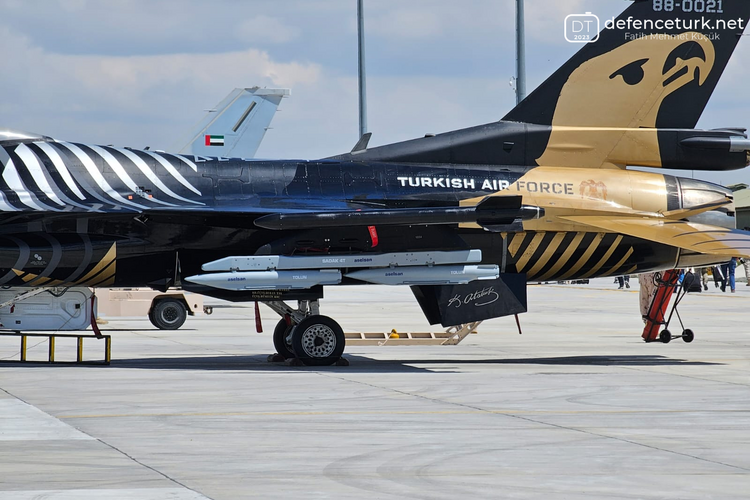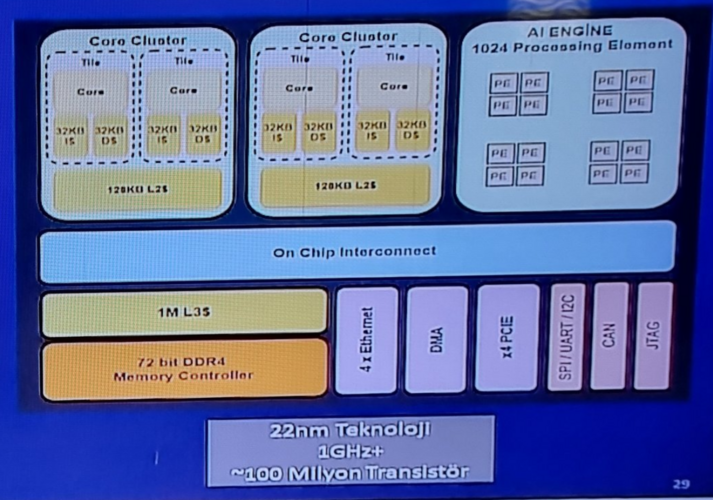You are using an out of date browser. It may not display this or other websites correctly.
You should upgrade or use an alternative browser.
You should upgrade or use an alternative browser.
TAI TF-X / Milli Muharip Uçak MMU Kaan
- Thread starter ocay
- Start date
DEFENCETURK'S INTERVIEW WITH THE HEAD ENGINEER
-We are currently starting the ground test phase for our National Combat Aircraft as you know.
Regarding the second prototype
-The detail parts manufacturing has started for our second aircraft. Assembly will probably begin by the end of the year. Before all of that there will be the production of our tools etc.
"Will you fly this prototype?"
-Yes. The aircraft you see in front of you will fly by the end of the year. We will continue flight testing this prototype as well, of course it will be within a limited envelope due to its systems and the aircraft itself. The next prototype will cover a more expanded flight envelope. We will have a lot of prototypes. We have a really aggressive schedule. We are planning deliveries to start in 2028. We will have around 7 prototypes but this could change. Because we will have a lot of test platforms as well, not just the National Combat Aircraft. We need to test these to support the schedule. We will have a lot of tests performed on a variety of platforms.
"What is the latest news on KAAN's static tests & the iron bird?"
-Our static test platforms are being prepared as we speak. We will start with the iron bird by this year's end.
Question Regarding the national engine's timeframe
-It would not be appropriate for me to comment on that but the process has started. Our companies in question have started working on it.
"Will there be differences between this prototype and the production aircraft? (or smth like that)"
-There are details in which I'm not allowed to comment on. But Block 10 will be very capable. Our AESA radar will be on our first aircraft. There may be a lot of differences between prototypes. This all depends on the data we gather from our flight tests, ground tests and maybe our wind tunnel tests. If you study similar aircraft such as the F-22 & F-35 you'll see those differences. We also know that our aircraft can change drastically and we are prepping our teams accordingly.
"Is the forward opening canopy a standard or will it change?"
-Our current plan is to keep it as is. Our technical teams have performed a lot of work and gave plenty of tradeoffs, and from these studies we figured that this was the best possible option for our aircraft.
"From which point onwards will the IWB's be active?"
-All of our designs have been made so that they will always remain active. When we will start weapons tests will depend on our program.
"Are there interested countries?"
-Yes, a lot of countries are currently interested. It's not up to me to specify which countries these are.
-We are currently starting the ground test phase for our National Combat Aircraft as you know.
Regarding the second prototype
-The detail parts manufacturing has started for our second aircraft. Assembly will probably begin by the end of the year. Before all of that there will be the production of our tools etc.
"Will you fly this prototype?"
-Yes. The aircraft you see in front of you will fly by the end of the year. We will continue flight testing this prototype as well, of course it will be within a limited envelope due to its systems and the aircraft itself. The next prototype will cover a more expanded flight envelope. We will have a lot of prototypes. We have a really aggressive schedule. We are planning deliveries to start in 2028. We will have around 7 prototypes but this could change. Because we will have a lot of test platforms as well, not just the National Combat Aircraft. We need to test these to support the schedule. We will have a lot of tests performed on a variety of platforms.
"What is the latest news on KAAN's static tests & the iron bird?"
-Our static test platforms are being prepared as we speak. We will start with the iron bird by this year's end.
Question Regarding the national engine's timeframe
-It would not be appropriate for me to comment on that but the process has started. Our companies in question have started working on it.
"Will there be differences between this prototype and the production aircraft? (or smth like that)"
-There are details in which I'm not allowed to comment on. But Block 10 will be very capable. Our AESA radar will be on our first aircraft. There may be a lot of differences between prototypes. This all depends on the data we gather from our flight tests, ground tests and maybe our wind tunnel tests. If you study similar aircraft such as the F-22 & F-35 you'll see those differences. We also know that our aircraft can change drastically and we are prepping our teams accordingly.
"Is the forward opening canopy a standard or will it change?"
-Our current plan is to keep it as is. Our technical teams have performed a lot of work and gave plenty of tradeoffs, and from these studies we figured that this was the best possible option for our aircraft.
"From which point onwards will the IWB's be active?"
-All of our designs have been made so that they will always remain active. When we will start weapons tests will depend on our program.
"Are there interested countries?"
-Yes, a lot of countries are currently interested. It's not up to me to specify which countries these are.
alberchico
I really should change my personal text
- Joined
- 14 January 2014
- Messages
- 704
- Reaction score
- 1,508
The fact that they're being very vague regarding the timeline of the domestic engine for this aircraft means that it is years away from completion. I feel like this is the one aspect of this project that's going to run into trouble. It's one thing to develop domestic engines for helicopters or drones, but for an F-22 sized stealth fighter ? That's a whole different ball game. If this project starts having delays or massive cost overruns I would not be surprised to see it canned in favor of using foreign powerplants.
So a weird info for y'all
According to KAAN's test pilot, the aircraft had a tendency to turn right all the time. Which in turn forced them to use asymmetric thrust to keep the aircraft straight. According to the chief test pilot, this issue has largely been fixed and Gökhan Bayramoğlu (the other test pilot) was relatively comfortable performing her taxi trials.
According to KAAN's test pilot, the aircraft had a tendency to turn right all the time. Which in turn forced them to use asymmetric thrust to keep the aircraft straight. According to the chief test pilot, this issue has largely been fixed and Gökhan Bayramoğlu (the other test pilot) was relatively comfortable performing her taxi trials.
- Joined
- 15 July 2020
- Messages
- 1,479
- Reaction score
- 4,544
- Joined
- 1 April 2006
- Messages
- 11,370
- Reaction score
- 10,181
Anadolu Images
Anadolu Images
Anadolu Images
Anadolu Images

ANKRA - Cumhurbaşkanı Erdoğan, Milli Muharip Uçağın adının "KAAN" olduğunu açıkladı
İstikbalin Yüzyılı Tanıtım ProgramıANKARA - Cumhurbaşkanı Recep Tayyip Erdoğan, İstikbalin Yüzyılı Tanıtım Programı'na katıldı. (2)Cumhurbaşkanı Erdoğan, Milli Muharip Uçağın adının "KAAN" olduğunu açıkladı.
Last edited:
Those lower engine nacelles seem VERY voluminous... if the Su-57 prioritizes low drag (to a fault, some would argue with respect to LO shaping) here, the polar opposite seems to be the case with Kaan.
- Joined
- 1 April 2006
- Messages
- 11,370
- Reaction score
- 10,181
For Kaan gigantism theory lovers...
Quick measurements give 14,35 m wingspan which may be slightly less due perspective distortion.
I'm too lazy now to measure concrete tiles approximate size on GE, still length calculations will be much more complicated process.
Quick measurements give 14,35 m wingspan which may be slightly less due perspective distortion.
I'm too lazy now to measure concrete tiles approximate size on GE, still length calculations will be much more complicated process.
Attachments
- Joined
- 29 November 2010
- Messages
- 1,773
- Reaction score
- 3,471
Dreamfighter
'Senior Something'
- Joined
- 13 July 2008
- Messages
- 483
- Reaction score
- 646
TFX is now KAAN, ... may come from Khan, an ancient Mongol and Central Asian title for a king or military ruler.
GE-engines Khan.
7 prototype iterations from what they've said we should see lots of small changes, not sure if it will be as drastic as X-35 to F-35 or YF-22 to F-22 but at this stage they don't even know themselves.So parts are being manufactured for the second prototype... And as per reports she will look a little different. Any thoughts?
Radonislav
ACCESS: Confidential
- Joined
- 16 November 2022
- Messages
- 151
- Reaction score
- 214
Well it is dependent on the other prototypes a s their performances. +Subsystems and changes made to them7 prototype iterations from what they've said we should see lots of small changes, not sure if it will be as drastic as X-35 to F-35 or YF-22 to F-22 but at this stage they don't even know themselves.So parts are being manufactured for the second prototype... And as per reports she will look a little different. Any thoughts?
Ainen
I really should change my personal text
- Joined
- 25 August 2011
- Messages
- 1,246
- Reaction score
- 1,665
As far as i understand, this is exactly a prototype, not a demonstrator.7 prototype iterations from what they've said we should see lots of small changes, not sure if it will be as drastic as X-35 to F-35 or YF-22 to F-22 but at this stage they don't even know themselves.So parts are being manufactured for the second prototype... And as per reports she will look a little different. Any thoughts?
According to the chief test pilot, GTU-0 is a technology demonstrator.As far as i understand, this is exactly a prototype, not a demonstrator.7 prototype iterations from what they've said we should see lots of small changes, not sure if it will be as drastic as X-35 to F-35 or YF-22 to F-22 but at this stage they don't even know themselves.So parts are being manufactured for the second prototype... And as per reports she will look a little different. Any thoughts?
Radonislav
ACCESS: Confidential
- Joined
- 16 November 2022
- Messages
- 151
- Reaction score
- 214
But keep in mind that "7 prototypes" includes this one too, so we will see 5 or 6 more KAAN development aircraft+ multiple testbeds for various subsystems
Precisely.But keep in mind that "7 prototypes" includes this one too, so we will see 5 or 6 more KAAN development aircraft+ multiple testbeds for various subsystems
The brake discs of KAAN will be produced at Kim Teknoloji Company in Kayseri.
View: https://twitter.com/gdhdefence/status/1654102071769980928?s=20
View: https://twitter.com/gdhdefence/status/1654102071769980928?s=20
TOLGA ÖZBEK'S INTERVIEW WITH THE CHIEF TEST PILOT OF KAAN (NATIONAL COMBAT AIRCRAFT/ MMU/ TF-X) BARBAROS DEMİRBAŞ

Mr. Barbaros, you got on the aircraft, started her engines and throttled her up. What did it make you feel like?
-The aircraft gives you a lot of confidence. Especially when the canopy is closed, the visibility is great. Ergonomically speaking the LAD and its interfaces etc. are very pleasant.
It's a really big aircraft as well. Which aircraft did you get to fly before the MMU?
-I've flown with a lot of aircraft. The number exceeds 40. The majority of my flights have been with the F-4 in the Air Force Command. Later on I started flying with the F-16. I was the commander of the test fleet for 5 years. But KAAN is very pleasant. You see I'm currently flying the Hürkuş, F-16 and the Global 6000. Each and every one of these planes have a special place in my heart but KAAN makes you feel different things. Flying a Turkish aircraft is an incredibly pleasant experience. I sometimes look at its wings, I touch it and get very proud. KAAN really wants to fly. If you look at her lines, lift and control surfaces etc. It's going to be an amazing aircraft.
How many knots did you reach in the taxi tests?
-We didn't go above 15. This aircraft is more of a demonstrator for us. Hopefully we will start modifying her from June onwards and get her ready for flight. This is what we would call a technology demonstrator. We are validating the processes with this aircraft. Because there is intense production and management activities going on. There is a massive organization behind all of this. So this is essentially a trial aircraft. The second prototype which is the P1, will cover the entire envelope. We will start integrating some systems to that airframe. We will achieve 4.5th gen characteristics with our Block 10 aircraft and 5th gen by Block 20's.
What is your foresight regarding P1?
-We are expecting it to fly in 2025. I would say we are lucky and happy to have such a good team. We always managed to meet our objectives in advance of the schedule. Hopefully this won't change.
You probably have high speed taxi tests now am I right?
-We expect high speed trials to take place after November. It could take place in December as well but winter conditions, the conditions on the runway etc. there will be a lot of factors involved.
There is a lot of work left to do then.
-Yes there is. Technical preparation, safety evaluations, our maturity level in the simulator, the production and the efforts to put the aircraft on the flightline are very important. Could there be delays, yes. Seasonal conditions, supply and production could have an effect. But our plan currently is to get this aircraft ready for flight on the 27th of December.
Our viewers kept asking. I thought I would ask you as well. When you were taxiing (during her first taxi test) one engine's nozzle was closed whereas the other one was open. Did you use a single engine during that taxi? Can we hear this from you as well?
-It was our first taxi (laughs). We gave a quick decision regarding the first taxi. The aircraft had a natural pull towards the right. And since the brakes and the stick controls were limited, I used asymmetric thrust to keep the plane on the centerline. Some F-4 experience came into play. But all in all it was a very pleasant experience. Today Gökhan (the other test pilot) was much more comfortable coming in. We get better day by day.
-We started good. I thought we would be experiencing more elemental issues. We first engaged the engines, then the hydraulics, the electrical systems, the cockpit systems were always more mature. We are going well.
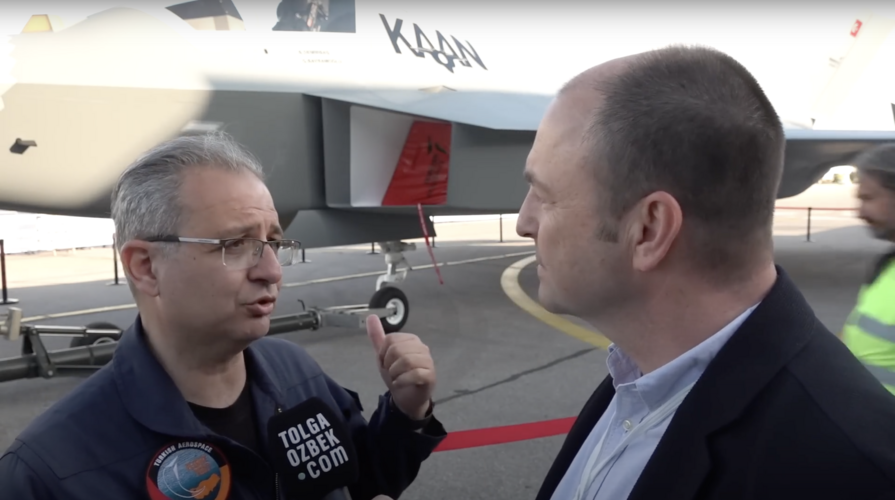
Mr. Barbaros, you got on the aircraft, started her engines and throttled her up. What did it make you feel like?
-The aircraft gives you a lot of confidence. Especially when the canopy is closed, the visibility is great. Ergonomically speaking the LAD and its interfaces etc. are very pleasant.
It's a really big aircraft as well. Which aircraft did you get to fly before the MMU?
-I've flown with a lot of aircraft. The number exceeds 40. The majority of my flights have been with the F-4 in the Air Force Command. Later on I started flying with the F-16. I was the commander of the test fleet for 5 years. But KAAN is very pleasant. You see I'm currently flying the Hürkuş, F-16 and the Global 6000. Each and every one of these planes have a special place in my heart but KAAN makes you feel different things. Flying a Turkish aircraft is an incredibly pleasant experience. I sometimes look at its wings, I touch it and get very proud. KAAN really wants to fly. If you look at her lines, lift and control surfaces etc. It's going to be an amazing aircraft.
How many knots did you reach in the taxi tests?
-We didn't go above 15. This aircraft is more of a demonstrator for us. Hopefully we will start modifying her from June onwards and get her ready for flight. This is what we would call a technology demonstrator. We are validating the processes with this aircraft. Because there is intense production and management activities going on. There is a massive organization behind all of this. So this is essentially a trial aircraft. The second prototype which is the P1, will cover the entire envelope. We will start integrating some systems to that airframe. We will achieve 4.5th gen characteristics with our Block 10 aircraft and 5th gen by Block 20's.
What is your foresight regarding P1?
-We are expecting it to fly in 2025. I would say we are lucky and happy to have such a good team. We always managed to meet our objectives in advance of the schedule. Hopefully this won't change.
You probably have high speed taxi tests now am I right?
-We expect high speed trials to take place after November. It could take place in December as well but winter conditions, the conditions on the runway etc. there will be a lot of factors involved.
There is a lot of work left to do then.
-Yes there is. Technical preparation, safety evaluations, our maturity level in the simulator, the production and the efforts to put the aircraft on the flightline are very important. Could there be delays, yes. Seasonal conditions, supply and production could have an effect. But our plan currently is to get this aircraft ready for flight on the 27th of December.
Our viewers kept asking. I thought I would ask you as well. When you were taxiing (during her first taxi test) one engine's nozzle was closed whereas the other one was open. Did you use a single engine during that taxi? Can we hear this from you as well?
-It was our first taxi (laughs). We gave a quick decision regarding the first taxi. The aircraft had a natural pull towards the right. And since the brakes and the stick controls were limited, I used asymmetric thrust to keep the plane on the centerline. Some F-4 experience came into play. But all in all it was a very pleasant experience. Today Gökhan (the other test pilot) was much more comfortable coming in. We get better day by day.
-We started good. I thought we would be experiencing more elemental issues. We first engaged the engines, then the hydraulics, the electrical systems, the cockpit systems were always more mature. We are going well.
- Joined
- 24 November 2008
- Messages
- 1,549
- Reaction score
- 2,606
Thx for posting @Canardzz !
Finally a reasonable statement on the status of the current aircraft and what's planned for the future.
Finally a reasonable statement on the status of the current aircraft and what's planned for the future.
Congratulations to TAI btw !This is what we would call a technology demonstrator. We are validating the processes with this aircraft...
So this is essentially a trial aircraft. The second prototype which is the P1, will cover the entire envelope. We will start integrating some systems to that airframe...
We will achieve 4.5th gen characteristics with our Block 10 aircraft and 5th gen by Block 20's.
This bit was also funny to translate for some weird reasonThx for posting @Canardzz !
Finally a reasonable statement on the status of the current aircraft and what's planned for the future.
Congratulations to TAI btw !This is what we would call a technology demonstrator. We are validating the processes with this aircraft...
So this is essentially a trial aircraft. The second prototype which is the P1, will cover the entire envelope. We will start integrating some systems to that airframe...
We will achieve 4.5th gen characteristics with our Block 10 aircraft and 5th gen by Block 20's.
-It was our first taxi (laughs). We gave a quick decision regarding the first taxi. The aircraft had a natural pull towards the right. And since the brakes and the stick controls were limited, I used asymmetric thrust to keep the plane on the centerline.
- Joined
- 15 July 2020
- Messages
- 1,479
- Reaction score
- 4,544
- Joined
- 15 July 2020
- Messages
- 1,479
- Reaction score
- 4,544
TFX KAANs engine, general design configuration of the engine is frozen and moved over to the detail design phase.
First run of TF-6000 turbofan engine is expected within 5-6 months, with 6,000lb of thrust.

First run of TF-6000 turbofan engine is expected within 5-6 months, with 6,000lb of thrust.

- Joined
- 15 July 2020
- Messages
- 1,479
- Reaction score
- 4,544
Editor of Defence Turkey Magazine Ibrahim Sunetci;
"In Pakistan, there was an engineering group of over 50 engineers working on the MMU, led by an engineer with Lockheed Martin experience. They were actively working on the MMU project and making designs. Tusaş Pakistan office said that they will build and fly a scaled MMU prototype this year.
Pakistan has applied to Tusaş to expand the Tusaş office in Pakistan and increase the number of employees. The office and staff will be expanded this year."
View: https://www.youtube.com/watch?v=8ykvyZTHG9Y&t=4769s
"In Pakistan, there was an engineering group of over 50 engineers working on the MMU, led by an engineer with Lockheed Martin experience. They were actively working on the MMU project and making designs. Tusaş Pakistan office said that they will build and fly a scaled MMU prototype this year.
Pakistan has applied to Tusaş to expand the Tusaş office in Pakistan and increase the number of employees. The office and staff will be expanded this year."
snne
ACCESS: Top Secret
- Joined
- 3 July 2022
- Messages
- 1,384
- Reaction score
- 4,489
What about the confidentiality of critical data? Pakistan has deep military relations with China and there's a reason why the US blocks the sale of LHTEC T800s for Paki T-129s as an example.Editor of Defence Turkey Magazine Ibrahim Sunetci;
"In Pakistan, there was an engineering group of over 50 engineers working on the MMU, led by an engineer with Lockheed Martin experience. They were actively working on the MMU project and making designs. Tusaş Pakistan office said that they will build and fly a scaled MMU prototype this year.
Pakistan has applied to Tusaş to expand the Tusaş office in Pakistan and increase the number of employees. The office and staff will be expanded this year."
View: https://www.youtube.com/watch?v=8ykvyZTHG9Y&t=4769s
- Joined
- 15 July 2020
- Messages
- 1,479
- Reaction score
- 4,544
- Joined
- 15 July 2020
- Messages
- 1,479
- Reaction score
- 4,544
GaN -GaAS - SiGe chipsets for AESA radars

Radonislav
ACCESS: Confidential
- Joined
- 16 November 2022
- Messages
- 151
- Reaction score
- 214
What does that AI engine do?Multicore processor being developed by Aselsan;
View attachment 699290
- 22nm fabrication process
- 4 cores operating @ 1+GHz
- 64KBx2 L1 Cache
- 128KBx2 L2 Cache
- 1MB L3 Cache
- AI Engine 1024 processing cores
- 72bit DDR4 Memory Controller
- 100 million transistors
alberchico
I really should change my personal text
- Joined
- 14 January 2014
- Messages
- 704
- Reaction score
- 1,508
TFX KAANs engine, general design configuration of the engine is frozen and moved over to the detail design phase.
First run of TF-6000 turbofan engine is expected within 5-6 months, with 6,000lb of thrust.

Wouldn't this engine be a bit underpowered for a heavy fighter like the TFX ? For example the engine that powers the Eurofighter has roughly 17,500 lbf of thrust. This engine has 6,000 lbf of thrust.
Edit: This article claims this engine is merely a stepping stone to the actual one as a way of giving their engineers experience developing heavy powerplants. It is a must read if you want to know more about the development of this engine.

TEI Begins Prototype Manufacturing of TEI-TF6000, Türkiye`s Most Powerful Turbofan Engine
We present the special interview with the General Manager & CEO of TEI, which we held on October 7 during the İstanbul Air Show 2022, where he talked about the TEI-TF6000 Engine, the most powerful turbofan developed in our country to date, with a dry thrust of 6,000 lbf.
 www.defenceturkey.com
www.defenceturkey.com
Last edited:
snne
ACCESS: Top Secret
- Joined
- 3 July 2022
- Messages
- 1,384
- Reaction score
- 4,489
It is actually developed to replace the Ukranian engines that currently power Kizilelma and Anka-3 UCAV/LWs.TFX KAANs engine, general design configuration of the engine is frozen and moved over to the detail design phase.
First run of TF-6000 turbofan engine is expected within 5-6 months, with 6,000lb of thrust.

Wouldn't this engine be a bit underpowered for a heavy fighter like the TFX ? For example the engine that powers the Eurofighter has roughly 17,500 lbf of thrust. This engine has 6,000 lbf of thrust.
Edit: This article claims this engine is merely a stepping stone to the actual one as a way of giving their engineers experience developing heavy powerplants. It is a must read if you want to know more about the development of this engine.

TEI Begins Prototype Manufacturing of TEI-TF6000, Türkiye`s Most Powerful Turbofan Engine
We present the special interview with the General Manager & CEO of TEI, which we held on October 7 during the İstanbul Air Show 2022, where he talked about the TEI-TF6000 Engine, the most powerful turbofan developed in our country to date, with a dry thrust of 6,000 lbf.www.defenceturkey.com
And yes, it has been long known in the Turkish defence media that they were developing this engine also as to develop critical tech to be used on the engine of Kaan/MMU.
Prof. Dr. Mahmut F. AKŞİT: Our TEI-TF6000 engine is actually an engine that we, as the TEI engineering team, built to train our team and develop them as a talent on our way to the National Combat Aircraft (MMU/TF-X). We have brought it up to this point with our own means. It is actually the most powerful engine ever designed and developed in Türkiye. It produces 6,000 lbf of thrust. The engine's thrust capacity can be increased to 10,000 lbf if an afterburner is added to the exhaust section. So it's a pretty powerful engine. We have built our engine as a technology development project to study the technologies to be used in the National Combat Aircraft's engine. We will also use it to validate and calibrate the design analysis software developed by our engineering team and the hypothesis’ used in the design.
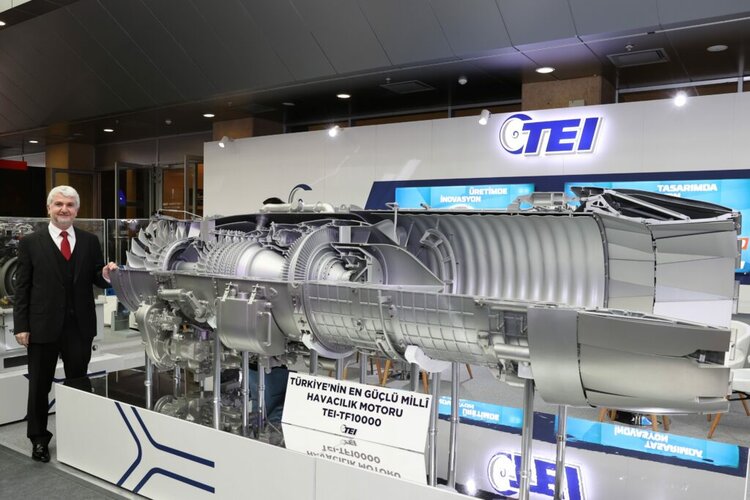
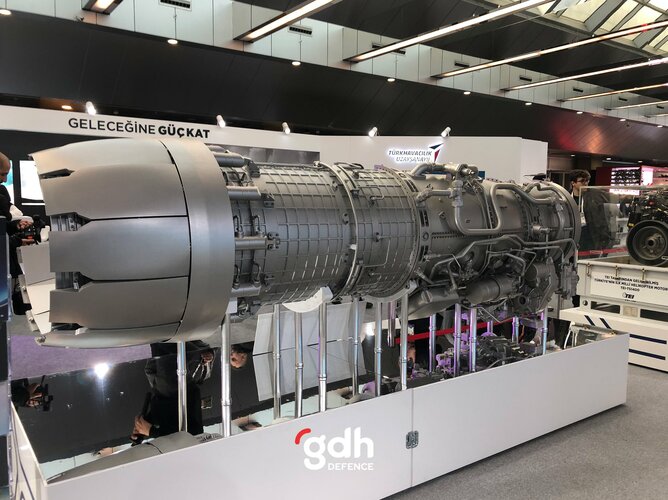
FighterJock
ACCESS: Above Top Secret
- Joined
- 29 October 2007
- Messages
- 5,584
- Reaction score
- 5,901
Any word yet whether or not the engines will be thrust vector capable or not? And if not will they be upgraded to feature it in the future.
Similar threads
-
-
-
Combat use of F-16s in Mideast spurs fresh demand: Lockheed
- Started by Triton
- Replies: 1
-
Aerospace Cooperation Opportunities Between Europe and Turkey
- Started by snne
- Replies: 20
-

